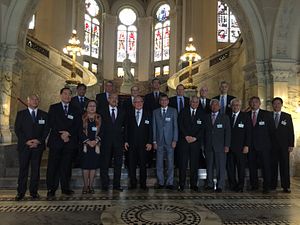On Tuesday, an arbitral tribunal in The Hague began hearing arguments on the merits of the Philippines’ case against China’s South China Sea claims. The tribunal at the Permanent Court of Arbitration will hold the first rounds of arguments on the merits of the case from November 24 to 30.
This round of hearings comes after the tribunal considered arguments on the question of jurisdiction. Though China has consistently refused to take part in the arbitral proceedings, in December 2014 Beijing released a position paper holding that the tribunal does not have the jurisdiction to rule on the case. China reasoned that the issues raised in the Philippine case could not be considered without determining sovereignty, which the tribunal is not empowered to do.
Beijing was dealt a blow in late October when the tribunal largely ruled in the Philippines’ favor on the question of jurisdiction. That decision allows the case to move forward to arguments on the actual merits of the case (while simultaneously considering some outstanding questions of jurisdiction). The hearings this week are the first round of those arguments.
According to a statement from the Philippine government, the Philippines delegation to the hearings comprises “48 individuals, including 6 Philippine ambassadors from different posts in Europe, counsel, advocates, expert witnesses, and support staff.” The delegation is led by Foreign Affairs Secretary Albert del Rosario and also includes Political Affairs Secretary Ronald Llamas, Solicitor General Florin Hilbay, and Representative Rodolfo Biazon, who chairs the Committee of National Defense and Security in the House of Representatives. The statement said the team was “fully prepared to present our case to the Tribunal.”
The tribunal itself is composed of five members: Judge Thomas A. Mensah (the tribunal president), Judge Jean-Pierre Cot, Judge Stanislaw Pawlak, Judge Rüdiger Wolfrum, and Professor Alfred H. A. Soons.
China responded to the opening of the hearing by continuing to condemn the entire proceedings. When asked for comment on the arbitration case, Foreign Ministry spokesperson Hong Lei reiterated that China’s “position is crystal clear: we will neither accept nor participate in the arbitration.” Hong called the arbitration case “an attempt to negate China’s territorial sovereignty and maritime rights and interests in the South China Sea” and a “breach of bilateral consensus with China and [the Philiippines’] commitment in the Declaration on the Conduct of Parties in the South China Sea (DOC).”
Though China has rejected the case, other countries have welcomed the attempt to use international law to untangle some of the issues involved in the South China Sea. While in the Philippines for the Asia Pacific Economic Cooperation forum, U.S. President Barack Obama said that the United States considers it “very important… simply to uphold the basic principle that these issues should be resolved by international norms and rule of law, and peacefully settled.”
Japanese officials said Prime Minister Shinzo Abe also raised concerns about China’s behavior in the South China Sea during the ASEAN summits in Malaysia this weekend. Meanwhile, Australian Prime Minister Malcolm Turnbull reportedly warned Chinese Premier Li Keqiang that China’s policies toward the disputed region were counterproductive, harming its relationship with its neighbors.
Also in Malaysia, Philippine President Benigno Aquino III urged China to respect the rule of law. “As the arbitration process we have entered into continues to its logical conclusion, we are hopeful that China would honor its word and respect the rule of law. The world is watching and expects no less from a responsible global leader,” Aquino said.
Though no other countries joined the Philippines’ case against China, both Vietnam and Indonesia have indicated they might consider filing their own South China Sea-related cases. Indonesia and Vietnam have sent observers to the hearings, as have Malaysia, Thailand, and Japan.
The international community is watching closely, as this is the first time arguments about the legality of China’s nine-dash line claim to much of the South China Sea have been put to the test. A final decision on the merits of the case is expected in summer 2016 – and though China has sworn to ignore any decision, it will face immense international pressure to comply.

































